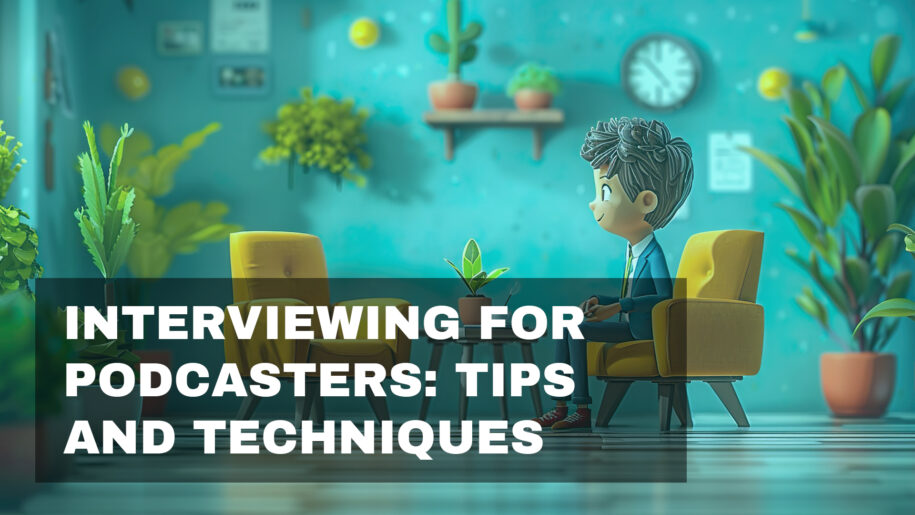Conducting engaging and insightful interviews is a crucial skill for podcasters. A well-conducted interview can provide valuable content, attract new listeners, and create memorable episodes. However, interviewing is an art that requires preparation, active listening, and the ability to steer conversations in meaningful directions. Here’s a comprehensive guide on interviewing for podcasters, with tips and techniques to help you get the most out of your interviews.
1. Preparation is Key
Overview: Successful interviews start long before the recording session. Preparing thoroughly ensures you can conduct a smooth and insightful conversation.
Steps to Follow:
- Research Your Guest: Learn about your guest’s background, work, and interests. Familiarize yourself with their recent projects, publications, or social media activity.
- Prepare Questions: Draft a list of questions that cover various aspects of your guest’s expertise and experiences. Aim for open-ended questions that encourage detailed responses.
- Set Clear Objectives: Define what you want to achieve with the interview. This could be educating your audience, uncovering new insights, or simply entertaining listeners.
Tips:
- Create a balance between prepared questions and the flexibility to explore interesting tangents.
- Share a brief outline or key questions with your guest beforehand to help them prepare.
2. Create a Comfortable Environment
Overview: A relaxed and comfortable guest is more likely to open up and provide candid, engaging responses.
Steps to Follow:
- Build Rapport: Start with some casual conversation to break the ice and build a connection with your guest.
- Explain the Process: Briefly outline how the interview will proceed, including any segments, breaks, or special features.
- Test Equipment: Ensure all recording equipment is functioning correctly, and do a quick sound check with your guest.
Tips:
- Keep the atmosphere light and positive to put your guest at ease.
- Respect your guest’s time by starting and ending the interview as scheduled.
3. Ask Engaging Questions
Overview: The quality of your questions determines the quality of the answers. Thought-provoking questions lead to insightful and engaging discussions.
Types of Questions:
- Open-Ended Questions: Encourage detailed responses and storytelling (e.g., “Can you describe your journey into this field?”).
- Follow-Up Questions: Dig deeper into interesting points raised by your guest (e.g., “Can you elaborate on that experience?”).
- Hypothetical Questions: Invite guests to speculate or think creatively (e.g., “What would you do if you had unlimited resources?”).
Tips:
- Avoid yes/no questions that lead to short, unengaging answers.
- Listen actively to your guest’s responses and be ready to ask spontaneous follow-up questions.
4. Active Listening
Overview: Active listening is crucial for maintaining a natural and engaging flow during the interview.
Key Actions:
- Show Genuine Interest: Nod, smile, and use verbal affirmations to show you are engaged.
- Avoid Interrupting: Let your guest complete their thoughts before jumping in with the next question.
- Reflect and Summarize: Periodically summarize what your guest has said to ensure understanding and highlight key points.
Tips:
- Take notes during the interview to capture important points and follow-up questions.
- Be present and focused, minimizing distractions and maintaining eye contact (if interviewing in person or via video).
5. Steering the Conversation
Overview: While it’s important to let the conversation flow naturally, sometimes you’ll need to steer it back on track or dive deeper into specific topics.
Key Actions:
- Redirect Gently: If the conversation veers off-topic, gently steer it back by linking the tangent to your next question.
- Probe Deeper: Encourage your guest to expand on interesting points with probing questions (e.g., “Why do you think that is?”).
- Manage Time: Be mindful of the interview length and pace your questions to cover all key topics.
Tips:
- Use transitions to move smoothly between topics (e.g., “Speaking of…”, “That reminds me…”).
- Be flexible and willing to explore unexpected but valuable tangents.
6. Conclude Effectively
Overview: A strong conclusion leaves a lasting impression on your audience and your guest.
Steps to Follow:
- Recap Key Points: Summarize the main takeaways from the interview.
- Final Thoughts: Ask your guest for any final thoughts or advice they’d like to share with your audience.
- Thank Your Guest: Express your gratitude for their time and insights.
Tips:
- Inform your guest about when the episode will air and any promotional activities.
- Share contact details or social media handles if your guest is open to further engagement with your audience.
7. Post-Interview Follow-Up
Overview: Follow-up activities are important for maintaining good relationships with your guests and ensuring a polished final product.
Key Actions:
- Send a Thank-You Note: Express your appreciation with a follow-up email or message.
- Share the Episode: Notify your guest when the episode is live and provide shareable links.
- Request Feedback: Ask for any feedback on the interview process to improve future episodes.
Tips:
- Tag your guest in social media posts promoting the episode.
- Consider providing a transcript or highlights to your guest for additional promotion.
Mastering the art of interviewing is essential for creating engaging and informative podcast episodes. By preparing thoroughly, asking thoughtful questions, actively listening, and steering the conversation effectively, you can conduct interviews that captivate your audience and provide valuable insights. Remember, the goal is to create a comfortable environment where your guest feels valued and heard, leading to a natural and compelling conversation. Happy interviewing!


